|
|
|
|
|
Cary
Brothers
|
|
|
|
I
can count on one hand the number
of times I've seen a Way Cool Music
interviewee on TV. Recently, as
I was flipping through the channels,
I noticed a familiar face on ET
on MTV. I had to do a double
take, but sure enough, there was
Cary Brothers on the small screen,
and not local access. Granted,
he wasn't being interviewed, but
he was there at the Grammy's with
friend Zach Braff getting a little
face time on national TV. While
other viewers were hearing about
Braff's latest girlfriend, I found
myself watching Cary and felt that
I was in on little secret that even
MTV wasn't hip to. In case
you're wondering, Cary Brothers
is on the brink of mainstream success.
After appearing on the Garden
State soundtrack, with a corresponding
appearance as a karaoke singer on
Scrubs, Brothers is definitely making
a name for himself. During
a recent trip to Nashville (Brothers'
hometown), Way Cool Music met up
with him to talk about the success
of Garden State's 'Blue Eyes,' the
Internet, and the importance of
building a grassroots following.
|
|
|
|
|
WC:
|
Tell
us a little bit about your background.
|
|
|
|
|
Cary
Brothers:
|
I
had my first kiss in the first grade
and her name was Emily Hanes and
she liked ponies. I seduced
her on the slide. But, she
has a child now, so that's disgusting!
I
was born in Nashville, TN and grew
up here in the ultra-conservative,
civil rights South, feeling that
I'm not a part of the place.
I wondered how the hell I
was ever born here! How it
relates to music is that being in
this tightly conservative environment,
local music was 80's rhinestone
cocaine country, which I despised
with livid hatred of all that music.
I escaped to music from over
the pond. The first records
I bought were The Smiths, Cure,
and Stone Roses. That was
the sound I loved. I felt
that being in Nashville was obvious
and everything was on the table.
There was something about
the mystery of the reverb-y Brit-rock
sound that really appealed to me.
It was a challenge and it
was something different that made
me want to make music. That
and REM because they were from the
South, I thought, "Wait. They're
from where I'm from? And they're
doing this?" It gave me hope
that someday I could do that too.
If they were Southerners escaping
the Southern cliche then there's
hope for a boy with a guitar.
|
|
|
|
|
WC:
|
Now
Nashville is more than just country
music. How do you fit into
the scene now? When you come
back, what's it like?
|
|
|
|
| CB:
|
When
I come back, I love this place.
It's a totally different vibe.
If Nashville was like it is
now when I was growing up, I probably
never would have left. But,
I had to get the fu ck out of Dodge.
Now I come back here and,
socially, this place has changed
in terms of tolerance. From
the time I was a little kid, I had
sympathy for what was considered
"the other" in Nashville. Whether
the problem was racism or homophobia,
I never understood why there was
so much hate. I mean, it was
just bullshit Christian reactionary
stuff and I never understood why
people who were different got shit
upon. Luckily, I grew up with
parents who, whatever their opinions
may have been, taught me to be open-minded.
But, with a lot of my friends'
parents, I'd go over to their houses
and just be shocked at what came
out of their mouths. I realize
thatās not just a Southern thing,
but they were much more vocal about
it here.
|
|
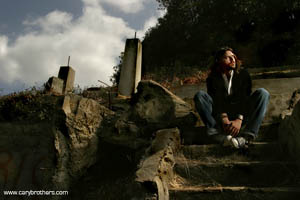
|
|
|
|
|
|
|
Coming
back to this town now, I see that
Nashville has broadened its horizons
a little bit. Itās still not
perfect, but It's changed enough
that I feel comfortable here now,
and I didn't feel that growing up.
|
|
|
|
|
WC:
|
When
did you move to Los Angeles?
|
|
|
|
|
CB:
|
I
went to college at Northwestern.
I left here when I was 18
and did four years in Chicago at
Northwestern and froze my ass off.
I had a band in college, a
stupid college band. Well,
it was stupid in the sense that
we didn't take it seriously and
we were drunk all the time, but
I was playing with four people who
were probably the four best musicians
I could be in a band with. If
we had taken it seriously, we probably
could have done something with it.
It was sad because we graduated
from college and they became investment
bankers and now they're calling
me up saying, "I'd quit my job to
come play with you." My old
drummer came to one of the shows
in Chicago (in December). He's
married and has a kid. He's
like, "I'll drop it all."
|
|
|
|
|
WC:
|
Did
you guys actually play shows in
Chicago?
|
|
|
|
|
CB:
|
We
started being the campus band and
we'd play all the fraternity parties
and shows around Northwestern. Then
we started playing shows in Chicago.
Right as things would have
gotten going, we graduated and everyone
went their separate ways. I
loved music so much, but I could
never take it seriously as an occupation.
I could just do it, and I
don't know why. When I was
a kid, I just picked up a guitar
and knew how to play. I took
some lessons, but I basically just
taught myself. I have no idea
how. But I always thought,
"I didn't earn this, so how can
I make a living from it?" Growing
up in Nashville, where there are
schools and education, and my dad's
a doctor and went to medical school,
there's all these steps. And
music just felt like there were
no steps. I didn't take it
seriously, but I was always writing
at home as therapy.
I
was always a film freak. When
I went to Los Angeles, I just immediately
became involved in film production
and moved up really quickly. I
started up a production company
and was producing independent films
within two years of arriving in
LA. I did a couple of indie
movies. But, just as that
was taking off, I hit this wall.
I loved movies so much, but
I fucking hated making them. I
was going home at night and writing
songs and getting my creative jones
on. Then, I'd come to the
office everyday and I kept helping
other people realize their creative
vision. Writers would come
in with a script that was 85% there
and I would help them restructure
things. Thatās what I became known
for. Writers would come to
me and I'd help shape their ideas
and they'd option it. Or friends
of mine would come in and I'd help
them. Zach (Braff) came in
and I helped him with Garden
State and that script. So
I did a lot of that. But,
it was frustrating because I was
helping other people and I'd send
them off and they'd succeed.
Then,
I hit the wall and told my production
partner that I couldn't do it anymore
and that I was going to be a musician
for a living. At that point,
I had started to play some open
mic things. Thatās when I
fell on the Hotel Cafe. I
had heard Gary Jules' cover of 'Mad
World' on the Donnie Darko
soundtrack and fell in love with
it. I had to see him live
and found out he was playing at
this new place called the Hotel
Cafe. I went down to see him
right when he was starting a residency
and I loved it. They used
to have an open mic there. I went
there on a Sunday night (to perform)
and Gary saw it and said, "I like
it. Come play with me." That
was one of the first times I had
been back up (on stage) in years.
It freaked me out to be in
front of someone I liked that much who
embraced it. He brought me
into the fold and then (the club)
started booking me. There
is no better place in the country
right now for music than the Hotel.
Obviously I'm biased, but
it's such a great room. The
people who are playing there are
at the top of their game. There's
such a regular crew and community
thatās been playing together for
awhile. Everyone supports
everyone. It's like Cheers with music. Everyone knows
each other and there's nothing else
like that in Los Angeles, where
there's been this pay-to-play mentality
for such a long time. Finally,
there's a real community of musicians.
And great young people run
it and that changed my life. Just
having a home room to go and play
every night. I just played
there once a month. I'd be
doing my shows or playing with a
friend of mine and it just became
something great that I don't think
many musicians experience. I
feel really lucky to have gotten
in because, now, it's impossible
to get booked there. Now,
it's a whole different thing and
I can't even get some of my friends
booked there because it's become
such a popular room. I'm just
glad I got in on the ground floor.
|
|
|
|
|
|
| 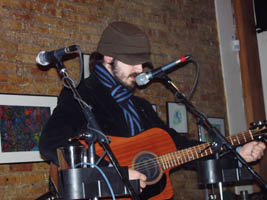
|
|
|
The
other thing with that room is that
it was such a singer/songwriter
room, and it's kinda developed past
that now. But, when I started
playing there, you had your voice
and your guitar and if that didn't
work, you didn't work. You
don't have a band to hide your weaknesses
and that's what was so great about
it. You just go up there and
if it works, it works and if it
doesn't, you're not going to be playing
anymore.
|
|
|
|
| WC:
|
How
long have you been playing there?
|
|
|
|
| CB:
|
About
two years.
|
|
|
|
|
|
WC:
|
How
long was it between the time you
left Northwestern, quit playing
music and started playing again?
|
|
|
|
|
CB:
|
I
had the production company for four
years, so four years. But,
you have to understand something.
Every night I was going home
and playing as if I was rehearsing
for shows that I wasn't going out
to play. When people ask how
many songs I have for the next record,
there are too many to count. I
just recorded everything. So,
I have stacks of tapes and CDs of
songs. I'd stay up until 5:00
A.M. writing a song and then pass
out. The next night, I'd have
an idea for a new song, so I'd take
out the tape with the half-done
song and work on the new one. I
would have no idea what the other
song was on that first tape. So,
I need to go through all those tapes.
I'm sure some of it sucks.
But, it was just constantly
writing and playing.
|
|
|
|
|
WC:
|
How
would you describe your music to
someone who's never heard you play?
|
|
|
|
|
CB:
|
I'm
definitely a Nashville kid worshipping
Brit pop. That's always going
to be my thing. But, what
the Hotel did was bring it back
to the acoustic guitar, basing everything
around it and getting a lot more
into finger picking and letting
softer, acoustic influences, like
Buckley and Elliot Smith, come through.
I have no idea how to describe
it. One of the reasons I liked
releasing the EP independently was
because, in talking to labels, they
asked, "What are you? How
can we sell you?" And that's
fine, but I don't want to be sold
yet. I just started. If
people like it, then they know by
my name what the sound is without
having to market myself or fit into
a genre. Singer/songwriter
isn't really what I do. Live
maybe it has a little of that, but
recorded, it's not. My EP
is not a singer/songwriter EP. I
hope it's bigger sounding and sounds
more like a band.
|
|
|
|
|
WC:
|
Do
you play with a full band live?
|
|
|
|
|
CB:
|
In
LA. Right now, I can't afford
to travel with them. Right
now, I just go out with my guitar.
But, as I get more money,
I'll bring more players out and
will hopefully get bigger.
|
|
|
|
|
WC:
|
Talk
a little bit about your Garden
State experience.
|
|
|
|
| CB:
|
Zach
and I went to college together at
Northwestern. We were kinda
in the trenches together in LA.
He was waiting tables and
I was trying to make ends meet.
We would just go out and see
bands together a lot. When
it came time to do Garden State
and he had done the first cut of
the film, he called me up to talk
about music ideas. He called
me because he wanted to use 'Honestly'
from my EP on the soundtrack. So,
he asked for a tape of everything
I had. At the time, I didn't
have any money, nor had I had any
quality studio time. So, I
just burned a CD of all these 8-track
songs, and the very last song on
the CD was 'Blue Eyes.' It
was a song I had just written for
my girlfriend and at the time, I
didn't think much of it. It
happened to be the last song on
there. Ultimately, the quality of
'Honestly' wasn't that good and
they didn't use it. But, when
they were putting the soundtrack
together, 'Blue Eyes' really stuck
out to Zach and the producers. It's
always the song you least expect
that catches. I'm just glad
I put it on the CD. On top
of that, Zach and I would sit around
with CDs and throw ideas out about
songs. Part of the reason
the soundtrack works is because
it isn't some corporate mandated
soundtrack. It's like a mix
tape among friends who love music
a lot. And that's why it succeeded.
It wasn't being sold to people.
It was born out of a love
of music. That's why I think
it's done well.
|
|
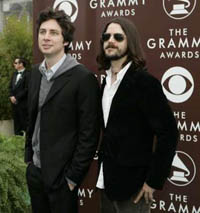
|
|
|
|
|
|
WC:
|
Is
it true that when Zach was shopping
the movie, he made sure they had
the soundtrack as well?
|
|
|
|
|
CB:
|
Yeah,
he came over to my place the night
before he sent the movie out and
we made a 25-song CD that he sent
out with all the scripts. Evidently,
people still have that CD. We
had a good idea what the music and
the energy was going to be like.
A lot of my sound, and the
sounds of the other bands, are the
sounds he really likes. Looking
back, I wish I would've had more
stuff, because I probably would
have had more stuff in the movie!
The funny thing is that the
version of 'Blue Eyes' that's in
the movie is the original home 8-track.
It wasn't until the movie
was at Sundance and I saw it in
the movie that I thought, "OK, that's
going to be on the soundtrack. I
need to redo the song!" So,
I went into the studio and just
kept going and that's how the EP
came about. People ask, "Why
is it only a 4-song EP?" Because
that's all I could afford.
|
|
|
|
|
WC:
|
If
you could have afforded more and
had more time, what would the EP
have been like? Would it have
become a full-length CD?
|
|
|
|
|
CB:
|
I
always liked the idea of an EP to
give people the taste of something,
to whet the appetite and get people
interested. I was also in
a crazy, new writing phase after
that and I knew this EP showed what
I could do. It's somewhat
of a spectrum, from pop-punk to
a little acoustic. It just
shows that the full-length is going
to be all over the place. I
don't want to be the guy to have
"a sound" where you listen to the
CD once and think, "Oh, this is
great." By the third time,
you're over it and are bored to
death. That goes back to,
"What is my sound?" I don't
want to define that. I want
to have a shot at doing a little
bit of everything. If I had
had more money, maybe I would've
gone ahead and done a full-length,
but I'm pretty happy with how it
turned out.
|
|
|
|
|
WC:
|
Is
Redeye is handling your distribution?
|
|
|
|
|
CB:
|
Yeah,
after all the soundtrack stuff,
I've been talking to labels and
who knows what's going to happen.
But, whatever happens, it's
going to take a long time. In
the meantime, I have all this momentum
from the Internet. And,
iTunes has been great to me. I
don't want to lose that momentum
waiting around for somebody to come
and change my life. I'm going
to change my life for me. I'm
not going to wait for somebody to
give me a paycheck and bless me
with their label wisdom. I
feel like I know what I'm doing
as well as anyone else right now.
I sit in a room with anybody
and I just feel confident. I
feel that I'm ready to do this on
my own if I have to. If someone
wants to come in and help and give
me a lot of money and allow me to
have enough creative control that
I'm comfortable, then that's great,
but it's not necessary. Listen,
I would love to have a nice studio,
but I'm paying my rent and bills
and I'm a professional musician
and happy as hell. If I can
have more than that, that's great,
but right now creative control is
much more important to me because,
if I have the chance to do what
I think I can do, and have the creative
control to do that, then I think
I can find more success then if
I have someone over my shoulder
steering me in a certain direction.
I don't necessarily trust
record labels anymore. I don't
think anybody knows the truth or
has the answer, especially the way
things are moving now with the Internet
and all the changes that are happening
in the music industry. I think
everybody is scrambling. And
while everybody else scrambles,
I'm going to keep marching forward
and do what I'm doing and let them
catch up.
|
|
|
|
|
|
| 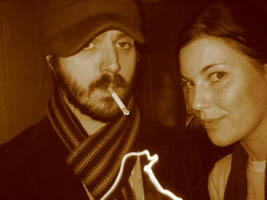
|
|
WC:
|
I'm
sure when you tell the label that
you don't want a sound to define
you, it scares the hell out of them.
|
|
|
|
| CB:
|
Definitely.
I understand that there's
a corporate mentality to it. They
want to sell records and they have
a board of directors who are concerned
with the bottom line. I completely
understand that. This is capitalism
and I get it! I'm not dissing
the record labels. That's the way
they do they're jobs. Good
for them. But, I don't necessarily
think I have to be a part of that
right now.
|
|
|
|
|
|
|
In
all honesty, I've built a good following
in LA and California, and worked
my ass off for the last year, really
working message boards and sites
like myspace.com. I've built
a fan base on the Internet by people
buying the music and going to my
site. I'm doing this free
song of the week to get people to
come back. It's almost as
if people get to see live shows
because I'm constantly giving them
new material that's rough and not
completed, kinda demo stuff. But,
the flip side of that is that I
haven't been out there touring for
two years when all of this happened.
I feel that if I went straight
from the Garden State soundtrack
to major label stuff, it wouldn't
work. I want to give
myself the opportunity to get out
there and tour and play on the back
of this EP. So that by the time
the record comes out, I will have
hit a lot of towns a couple of time.
I feel there are a lot of
bands who don't get out there, local/regional
bands, that get a label deal. They
get the big hit single that's sold,
sold, sold. That record and
single sells a lot of copies, but
when they come around with that
second record, nobody gives a fuck
about it because the public doesn't
care about them.
The
most important thing to me about
putting this EP into stores independently
is that people can walk into a store,
buy it and hopefully they'll love
it and they'll feel like it's "theirs."
That's what I love about music
now. I find something new
and it's "mine" for a certain amount
of time. Sure, more and more
people are going to find out about
it, and then I can call them "sell-outs."
But, for that certain amount
of time, they are "your" band and
you want to see them when they come
to town and you want to support
them and buy the t-shirts because
you want to wear with pride this
music you love. I want to
try to build more of that and take
it slowly. I have all the
time in the world. I don't
need the big payday right now. I'd
rather allow this thing to take
time rather than try to go for broke
and watch it flame out, which happens
to so many bands. I feel like
I forget bands with greater frequency
than ever before. I remember
songs, but I don't know who the
band was, and I don't really care
about them.
|
|
|
|
|
WC:
|
And,
you actually respond to the messages
left on your message board. People
seem amazed by that.
|
|
|
|
|
CB:
|
It's
great. It's because I care.
I care when people send me
emails and say that 'Blue Eyes'
is going to be the first song at
their wedding or that some song
helped them through their depression.
That means something to me
because I'm a music lover first
and know what it's like for a song
to move me. I'm not some egotistical
musician who thinks, "I'm going
to change the world because my music
is incredible." I have all
the time in the world to be an asshole!
But, thatās what music does
for me and I'm so happy to do that
for other people. It's tough
now because, with the Garden
State stuff, there are 500,000
people who bought that CD and that
are into the music.
|
|
|
|
|
WC:
|
And
you are one of the more accessible
people on the soundtrack. You're
not going to email The Shins and
get a response.
|
|
|
|
|
CB:
|
Right.
I consciously made that decision.
I could pull my email address
off the Internet and then I become
less accessible. And, I could
not answer emails and let people
post on the board. That's
easy. When I got home for
the holidays, I spent Christmas
Eve night, from 1 A.M. to 9 A.M.,
8 straight hours responding to emails.
My eyes almost popped out
of the head and my hands were all
cramped, but that's important to
me. When I was a kid, when
I wrote anybody and got something
back, it made me feel great! I
don't necessarily think I'm that
important, but if they do, that's
great. It's amazing. I
don't take any of this for granted.
I feel that I was blessed
with this opportunity and I'm going
to be gracious and not be an ass.
If they care enough to write,
I'll care enough to write back.
It's getting more difficult.
It's going to hit a point when I'm
on tour where I can't respond to
everything and I'm sure people will
get pissed off. But, until
then, I'm going to try to communicate
with people as much as I can.
|
|
|
|
|
WC:
|
What
has the audience been like over
the past two years since you started
playing the Hotel Cafe and then
with the release of Garden State.
|
|
|
|
| CB:
|
The
soundtrack definitely broadened
the perspective a lot. In
Los Angeles, indie rock, folk loving
people have been around. But,
now I feel like It's expanding to
14 - year - old girls and their moms.
I'm getting emails from all
of them! The fact that the
song is having the generational
reach is cool. I thought that
since my songs were more acoustic
based and really heartbreak songs,
it would lean more to the female
audience. But, it's amazing
how many dudes have really responded,
and are willing to admit that. They
email me and say things about it.
That's the stuff I listen
to, so I was hoping there were more
like me out there.
|
|
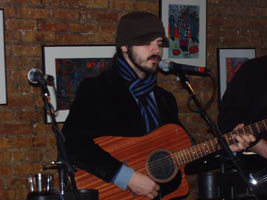
|
|
|
|
|
|
WC:
|
You
recently worked with Joshua Radin.
Tell us about that project
and wearing the producer hat.
|
|
|
|
|
CB:
|
Josh
is another old friend of mine who,
out of the blue, came up to me and
said that he wanted to do some songs.
I was like, "OK." Then,
he opened up his mouth and out came
this incredible voice. I thought,
"Where have you been, dude? What's
going on?" He's a really good
songwriter and he came to me and
asked if I could record some songs.
We did three or four demos
at my house and gave them to Zach,
who listened to them while he was
shooting a Scrubs episode. They
ended up putting the demo of 'Winter'
on the show. We did that and
he got a lot of attention from it.
It's a great song.
After
I finished my record, Josh flew
out to LA. Chad (Fischer), who produced
my record, and I did Josh's record.
We were just in a zone and
figured we'd just keep going. Basically,
we just pulled Josh up and said,
"Sing!" and just kept moving forward
with him. I'm really proud
of those songs and think he has
a lot of potential. I'd
really like to end up touring with
him before the end of the year.
|
|
|
|
|
WC:
|
Whose
career path do you see yourself
following?
|
|
|
|
|
CB:
|
I
kinda like what Ben Gibbard has
done. I love that development
and how they gave it time. It's
like I said about taking time and
not worrying about 8 billion records
at the outset and taking the time
to develop an audience. Yeah,
I have a boost because the Garden
State thing, but that doesn't
mean I want to go full speed ahead
right now. I'm ready to step
back and then gradually build. But,
I like what Ben has done, and what
Bright Eyes has done. They've
kept indie alive a little longer.
|
|
|
|
|
WC:
|
Any
advice for an aspiring singer/songwriter
who wants your career at this point?
|
|
|
|
|
CB:
|
I
say get a 4-track or an 8-track
and just record. The reason
that things are happening for me
is because I was afraid for a long
time. I was afraid of putting
stuff out there. I was doing
stuff at home alone, which allowed
me to get my chops because I was
playing all the time, but stepping
out into the real world and putting
your stuff out there is a huge risk.
I think if you're unwilling
to take that risk now, then get
a 4-track or an 8-track and just
write, and write, and write, and
write. Don't stop writing.
Write shitty songs, write
good songs. Don't stop writing
and don't stop working. Get
out there and find a way to get
a website up. Get on these
online communities and work fans
and get them into the music. Just
do the legwork. That's all
it is; it's just legwork.
Before
the Garden State soundtrack
came up, I spent months staying
up all night long. I didn't
have any money. I had a computer
and an Internet connection. I
had to find ways to find audiences.
I literally sent emails one
at a time to people that were on
certain boards that liked a certain
kind of music, just to see if they
would listen. At first, five
percent would listen, then ten percent,
and it just kept growing. When
the Garden State stuff happened,
it just jumped after that. There
was an awareness for a few thousand
of people across the country before
the soundtrack happened. I
feel that if I had to keep going
with that, I could've built an even
more grassroots thing. Mixing
grassroots Internet work with the
soundtrack, it all just came together.
If
you're young, the most important
thing is to write. Find an
open mic if you can and play every
night of the week that you can.
I know so many people who
are so gifted but feel like, because
they have talent, the world owes
them, that they don't have to do
the work. They think that
someone is going to come along and
make it all happen for them. They
don't do the open mics and they
don't work hard. It's a matter
of going out and doing the legwork.
The talent part, you either
have it or you don't.
|
|
|
|
|
WC:
|
You're
working on a new CD. Are you
going to do extensive touring behind
it?
|
|
|
|
|
|
| 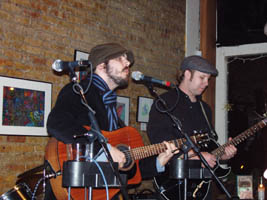
|
|
CB:
|
Yeah.
What I'd really like to do
is get this record together and
hit the road so I don't have to
think about it any more. I
know what I want it to sound like.
I know what the songs are
going to be. Then start touring;
shoot for a release of the full-length
in June. I'm talking to a
lot of labels, both indie and major,
so who knows what's going to happen.
But, if things go well enough
with the EP release, and distribution
through RedEye, maybe I'll do that
again. I'll probably be touring
until the end of the year. I
plan on touring for a couple of
years pretty solidly.
|
|
|
|
|
|
WC:
|
Other
than Ben Gibbard, what other music
are you currently into?
|
|
|
|
|
CB:
|
I'm
really into this band called Gersey.
I saw them play the Knitting
Factory in L.A. and was amazed.
I'm also into Huge. They're
a beautiful band. I've been
listening to the Doves a lot again.
I just can't get enough of
them. I've also been going
back and listening to The Cars,
Elvis Costello, and Squeeze. It's
a weird balance between the old
and the new. I go into my
historical era. New stuff,
the Keane record is pretty cool.
I've kinda been a song guy
lately. I've been so busy
that I don't have time to love an
album, so I love songs. There's
a Secret Machines song that I worship,
and the Snow Patrol song, 'Spitting
Game s'. I know it's a good song
when I'm driving my car and find
myself driving 15 miles per hour
faster.
|
|
|
|
|
|

|
|
|
|
|
What's the worst job
you've ever had? Delivering
tourists maps
across the state
of Tennessee
in 100 degree,
August, Tennessee,
humid heat in
a station wagon
with no air
conditioning.
I would
go and get a
plate of maps,
put as many
as I could in
the back of
my station wagon
until the tires
were ready to
pop. It
was my job to
just drive outside
the city and
hit every hotel
at every stop
and convince
them to put
these maps on
their front
counter and
accept a box.
It was
blazing hot
summer and I
had no A/C.
I probably
drank about
10 jugs of Mountain
Dew and smoked
about 4,000
cigarettes.
Music
saved my life.
It was
pretty funny
because I was
driving around
in a station
wagon full of
maps, cranking
Public Enemy
in redneck parts
of Tennessee.
But, they
paid me by the
hour, so I would
drive as far
away as humanly
possible and
come back 24
hours later.
I wasn't
stupid!
|
|
|
|
|
|
What's your favorite
movie or lyric quote? From
Big Trouble
in Little China,
"It's all in
the reflexes."
|
|
|
|
|
|
Who would you want to
star in the movie of your life? Billy
Crudup.
|
|
|
|
|
|
What's your favorite TV
theme song? Alf.
|
|
|
|
|
|
WC:
|
How
does
that
go?
I
know
there's
no
follow-up,
but
I
don't
know
that
song!
|
|
|
|
CB:
|
You
know
what,
it's
not
Alf.
I
had
the
melody
and
thought
it
was
Alf,
but
it's
the
Facts
of
Life.
|
|
|
|
|
|
|
If you were a
superhero, what would your name be?
Badass
Guy.
|
|
|
|
|
|
What do you want to be
when you grow up? Plumber.
|
|
|
|
|
|
Finally, why are there
so many songs about rainbows?
Because
frogs are curious.
|
|
|
|
|
| WC:
|
Thanks
a lot of meeting us in the middle
of your hometown.
|
|
|
|
| CB:
|
No
problem, thanks!
|
|
|
|
To find out more information about Cary
Brothers, visit his website at www.carybrothers.com.
|
|
|
|
|
|
|
|